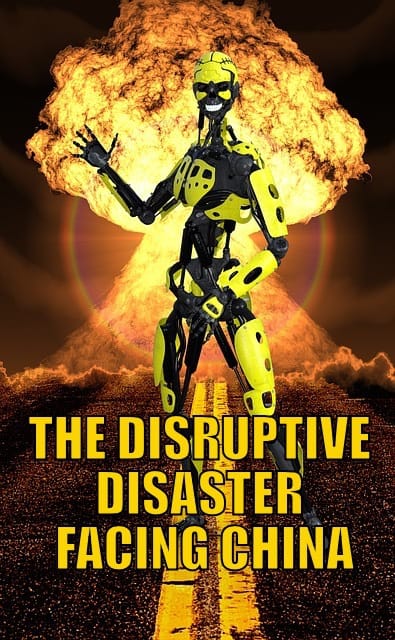To follow is an excellent article that shines a ray of hope for anyone that believes we are heading towards a more centralised world with bigger governments gaining even more control.
Dan Denning previously wrote for Money Morning in Australia, after shifting there from the US. We heard him speak at the Gold Symposium in Sydney on a couple of occasions too. He is now publishing a newsletter in the UK called Capital and Conflict.
Interestingly what Dan sees coming fits in with a theory we had a while back as to why “the Chinese” won’t take over New Zealand. Dan has a theory as to a type of technological change that might come and completely disrupt China’s government subsidised manufacturing sector. Similar changes will also impact the banking sector.
So he sees big changes ahead but that through these there will be opportunities for those with their eyes open. Plus on the other side, a much better world than we have currently.
We hope he is correct…
The Disruptive Disaster Facing China
Dan Denning, Contributing Editor, Money Morning
Today’s letter is headed to the future. I’m going to show you how everything has come full circle. Manufacturing will come back to America and Europe (and Australia). Robots will replace humans. And then the robots themselves will be replaced.
All of this portends a much brighter future for the planet. But it also portends a major disruptive disaster for China. The ‘industrial economy’ itself will change beyond recognition. And more than that, any industry or institution which relies on a model of centralised production or decision making will be under threat. Manufacturing, finance, energy, medicine, politics. All of them.
The result will be a period of rapid and disruptive change unlike any you’ve ever seen. And not just change. But growth and wealth and freedom. For every incumbent industry that’s competitively disembowelled, a new one will emerge. Trillions lost. Trillions gained. For every elite-controlled political party that falls apart, more local and accountable power structures will emerge. All at a breakneck pace.
When banking dies
But let me back up and deal with the present and the slow, painful death of banking as we know it. Negative interest rates and quantitative easing (QE) are killing the banks and poisoning the real economy.
Let’s talk about Germany. German banks are hoarding cash in vaults in order to avoid paying negative interest rates at the central bank. And now, a second German bank has passed on negative interest rates to depositors. And I’m not talking about Commerzbank and Deutsche Bank, both of which are charging interest on large accounts by corporate and institutional customers. I’m talking about savers with money in the bank being charged for it.
Skatbank, a German co-op, has been charging interest on customer accounts over €500,000 since 2014, according to the Financial Times. The German bank business model relies heavily on net interest income, according to the FT. That’s the difference between what the bank pays out in interest to shareholders and creditors and what it earns in the interest it charges for loans.
The trouble is, the loan business isn’t great in Germany. If you’re not earning a lot of interest income, and you’re paying 0.4% to hold excess reserves with the central bank (thanks to the European Central Bank’s negative deposit rates), then your margin is getting squeezed. That’s when you start doing some squeezing of your own, if you can.
It’s been called a ‘custodian charge’ by the Raiffeisen bank in Gmund am Tegernsee. It sent a note to customers telling them deposits over €100,000 would now be charged — wait for it — 0.4%. And you wondered if the costs would be passed on to the customer. They almost always are.
If you’re not German and you don’t have over €100,000 in your savings account, you might think this doesn’t matter to you. It does. For two reasons.
First, what can be done to commercial, institutional, and high net worth depositors can be done to anyone. Once you’ve established the precedent, it’s only a matter of extending it to everyone. The precedent has been established.
Second, a rational depositor doesn’t leave their money in a bank that charges interest. They either cash out — literally — and buy an asset which is not losing value, or they put their cash into another currency (like, say, gold), or they move their money to a different bank.
Can you see the problem? Banks seeking to protect their net interest margin and secure the portion of their capital base made up by deposits, actually hasten the erosion of both by charging depositors. You cause a bank run by trying to prevent one. That’s not the textbook definition of insanity. But it lives just down the page.
This is how banking dies.
Centralisation no longer fit for purpose
The rest of today’s letter is a bit wonky. Give it a miss if you’re not interested in how the world might change. But if you don’t mind a few mixed metaphors, buckle up buttercup! I’m about to paint a picture of a world that’s about to get a lot more chaotic but, ultimately, quantitatively and qualitatively better for ordinary people.
My argument is simple: in a fully connected, networked, and globalised world (long supply chains, global division of labour, cheap energy and capital and labour) centralisation is neither a viable nor efficient way to organise a business, a government, or a body politic. Thus, everything you know and are familiar with is in the process of changing quickly.
That change comes first in the form of existing/incumbent businesses and institutions that can’t adapt to the change. They’re breaking down. And in some industries and sectors or parts of civilisation, there’s nothing to replace them yet. There’s a vacuum. And in a vacuum, nothing can happen.
Take politics as an example. The working class and the middle class have been gutted like a fish by globalisation. Their incomes have gone down, in real terms, for the last 30 years. High-wage, life-long manufacturing jobs have moved to the developing world. Whoosh!
True, they’ve had access to cheaper goods thanks to China’s emergence as a global low-cost manufacturer. But the only way they can afford those cheaper goods is through cheap credit provided by Big Finance. Hence the explosion in consumer and household debt.
And hence so many people feeling like their quality of life and their happiness has declined, even as material standards of wealth have never been higher for so many. Being surrounded by material possessions you’re paying 17% interest on is not freedom. It’s casually dressed and air conditioned servitude, with Netflix to keep you company.
Jeremy Corbyn and Donald Trump both accidentally tapped into a deep well of anxiety and resentment over the circumstances I’ve described above. Both have responded in similarly populist and inept ways. But it’s important not to lose sight of the fact that their very rise to national political prominence in Britain and America, respectively, represents the loss of centralised control by national political parties.
The interests of the elites who run those parties — getting re-elected, earning a nice pension, feeling smug and self-righteous about bossing ‘the little people’ around, keeping those people in debt and on a tight leash — are no longer the same as the people they claim to represent. Centralisation has given way to anger. Anger to fragmentation. Fragmentation will eventually give way to localisation. And with localisation, will come the reformation of more sensible and more accountable political power.

It’s happening outside politics too. Automation, robotics, and 3D printing will obliterate China’s low-cost, state-subsidised manufacturing industry. Low-cost workers have replaced high-cost workers. But now robots will replace low-cost workers. And then 3D printing and nanotechnology will replace robots. For emerging markets and China, all the economies of scale that have worked to drive extraordinary GDP growth over the last 30 years, using exports to lift hundreds of millions out of poverty, will suddenly be challenged by technology trends in manufacturing which favour localisation and decentralisation. They will have adopted an economic growth model just at the point where technology makes it unviable.
You’ll see it happen in one industry after another. The decentralisation of finance and credit (when banking dies). The decentralisation of energy production (when solar kills fossil fuels and the rise of the micro-power station kills the centralised and expensive energy grid). And imagine the benefits of cheap and abundant power!
If energy is cheap, clean water for sanitation and agriculture becomes as easy as desalination. Disease, hunger, and poverty all become problems that technology and the evolution of competition solve. Government policy and centralised planning or the centralised collection and redistribution of personal income, become solutions to problems which technology has solved. The state shrinks. Freedom and wealth grow.
The cost of change
All these technology trends are converging to produce a period of tremendous creative destruction. The destruction, from a political point of view, threatens to overshadow the wealth and opportunity that will be created. People fear change because it creates winners and losers. And it certainly will create losers.
You think Ford doesn’t know Tesla and Google are coming for it? You think ExxonMobil and Saudi Aramco execs don’t squint at the sun in the sky and see a relentless stalking commercial predator? You think Goldman Sachs and JP Morgan lawyers don’t lie awake at night wondering how to prevent the day when there’s cryptocurrency securitised by gold?
The decentralisation of our world’s key political, financial and economic institutions is a threat to those in power who benefit from the current system. That’s why they’re fighting it. But they may as well be fighting gravity or the passage of time itself.
Evolution — at least as it works in the marketplace — rewards those businesses and organisations that solve problems and give people what they value most efficiently. Of course that extends to non-material values as well. If voters want security, then the barbarians that were at the gate last year will enter the castle keep this year. The world will go backward and look inward for a bit.
But left to its own devices, technological change drives wider cultural change — usually for the better. A great new cycle of change will be upon you. And even though old industries and institutions will vanish quickly, new ones will emerge that you will benefit from (and could profit from). The world will be qualitatively better for the coming decentralisation. It will be quantitatively richer.
Money and power — economic and political — will be transferred from the strong hands hiding behind the walls of the deep state to the hands of ordinary people doing business together at a local level, without the malevolent predations of big institutions.
It won’t be a violent revolution. It will be a peaceful evolution. A triumph of human ingenuity and individual liberty over political power and pathological control.
That’s the dream anyway. And with any luck, it’ll become a reality faster than you’d expect.
Until next time,
Dan Denning,
Contributing Editor, Money Morning
Editor’s note: Long time readers will remember Dan Denning, former Publisher of Money Morning. Dan has now gone on to the UK, where he is the Publisher at Capital and Conflict. The above article is an edited extract from that publication.


Pingback: How Will the Global Monetary System Change Take Place? - Gold Survival Guide